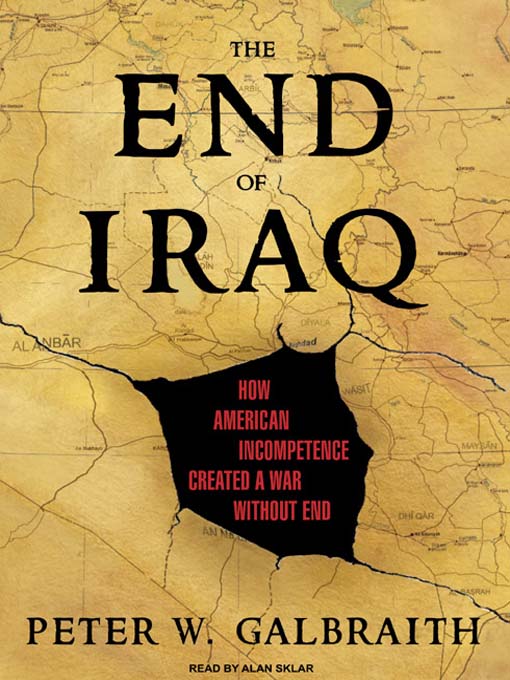- All Fiction
- Military Fiction
- Historical Fiction
- Mystery & Thriller
- Romance
- See all fiction collections
The End of Iraq
How American Incompetence Created a War Without End
George W. Bush broke up Iraq when he ordered its invasion in 2003. The United States not only removed Saddam Hussein, it also smashed and later dissolved the institutions by which Iraq's Sunni Arab minority ruled the country: its army, its security services, and the Baath Party. With these institutions gone and irreplaceable, the basis of an Iraqi state has disappeared.
The End of Iraq describes the administration's strategic miscalculations behind the war as well as the blunders of the American occupation. There was the failure to understand the intensity of the ethnic and religious divisions in Iraq. This was followed by incoherent and inconsistent strategies for governing, the failure to spend money for reconstruction, the misguided effort to create a national army and police, and then the turning over of the country's management to Republican political loyalists rather than qualified professionals. As a matter of morality, Peter W. Galbraith writes, the Kurds of Iraq are no less entitled to independence than are Lithuanians, Croatians, or Palestinians. And if the country's majority Shiites want to run their own affairs, or even have their own state, on what democratic principle should they be denied?
If the price of a unified Iraq is another dictatorship, Galbraith writes, it is too high a price to pay. The United States must now focus not on preserving or forging a unified Iraq but on avoiding a spreading and increasingly dangerous and deadly civil war. It must accept the reality of Iraq's breakup and work with Iraq's Shiites, Kurds, and Sunni Arabs to strengthen the already semi-independent regions. If they are properly constituted, these regions can provide security, though not all will be democratic. There is no easy exit from Iraq for America. We have to relinquish our present strategy—trying to build national institutions when there is, in fact, no nation. That effort is doomed, Galbraith argues, and it will only leave the United States with an open-ended commitment in circumstances of uncontrollable turmoil.
Galbraith has been in Iraq many times over the last twenty-one years during historic turning points for the country: the Iran-Iraq War, the Kurdish genocide, the 1991 uprising, the immediate aftermath of the 2003 war, and the writing of Iraq's constitutions. In The End of Iraq, he offers many firsthand observations of the men who are now Iraq's leaders. He draws on his nearly two decades of involvement in Iraq policy working for the U.S. government to appraise what has occurred and what will happen. The End of Iraq is the definitive account of this war and its ramifications.
-
Creators
-
Publisher
-
Release date
September 16, 2008 -
Formats
-
OverDrive Listen audiobook
- ISBN: 9781400127771
- File size: 276050 KB
- Duration: 09:35:06
-
-
Languages
- English
-
Reviews
-
Publisher's Weekly
Starred review from May 22, 2006
Galbraith, a leading commentator on Iraq thanks to his recent articles in the New York Review of Books
, presents a clear-eyed and persuasive case against the Bush administration's nation-building project there. As a former U.S. diplomat with long experience in Iraq, he offers an insider's view of the American occupation's failures—the poor preparation for post-invasion chaos, the cluelessness about Iraqi politics, the incompetence and corruption of the occupation authority—while advancing a deeper critique. With Saddam's dictatorship and the Baathist party and army that supported it gone, he contends that Iraq is irrevocably splitting into a pro-American Kurdistan in the north, a pro-Iranian Shiite south and an ungovernable Sunni center. America "cannot put the country back together again and it cannot stop the civil war," he insists. Deeply skeptical of attempts to reunify the Iraqi state, he proposes that the U.S. withdraw from Arab Iraq and "facilitate an amicable divorce" between the fractious sections. Galbraith advised the Iraqi Kurds during recent constitutional negotiations and is palpably sympathetic to their national aspirations; his argument sometimes feels like a brief for Kurdish separatism. Still, Galbraith's authoritative grasp of the issues and his cogent, forthright call for disengagement ensure that the book will move into the center of the debate over American policy in Iraq.
-
Loading
Why is availability limited?
×Availability can change throughout the month based on the library's budget. You can still place a hold on the title, and your hold will be automatically filled as soon as the title is available again.
The Kindle Book format for this title is not supported on:
×Read-along ebook
×The OverDrive Read format of this ebook has professional narration that plays while you read in your browser. Learn more here.

